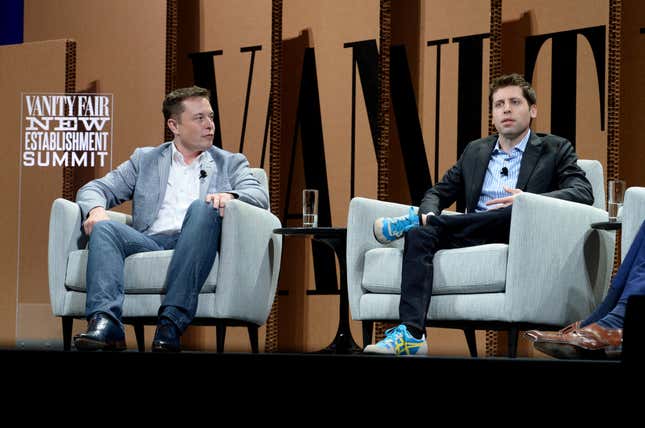
The feud between Elon Musk and Sam Altman has been years in the making, litigious, and above all else, personal. Or at least it used to be. Now Musk is holding Altman’s feet to the fire for his wavering loyalties to President Donald Trump.
The bad blood between two of the leading figures in artificial intelligence goes back to 2018, three years after they helped found OpenAI, which Altman still leads (despite briefly being ousted in 2023). Musk, the Tesla (TSLA) CEO and world’s richest person, later left OpenAI and repeatedly sued to stop it and Altman’s plans to make it a for-profit enterprise.
Even after all that, as critics started raising ethics concerns over Musk’s new role as an omnipresent top adviser to Trump heading up his so-called Department of Government Efficiency, Altman declined to add fuel to the fire.
“I may turn out to be wrong, but I believe pretty strongly that Elon will do the right thing,” Altman said at The New York Times’ DealBook Summit last month. “[I]t would be profoundly un-American to use political power, to the degree that Elon has it, to hurt your competitors and advantage your own businesses.”
But things started to change this week.
Despite Musk’s strong relationship with the newly inaugurated president, and his own $50 billion artificial intelligence firm xAI, it was Altman’s OpenAI that Trump worked with to announce major new investments on his first full day in office. And it was Altman who Trump called “by far the leading expert based on everything I read,” during a news conference Tuesday announcing the so-called Stargate Project.
Stargate is a collaboration between OpenAI, Oracle (ORCL), SoftBank (SFTBY), and other firms to invest $500 billion in U.S. infrastructure for AI over the next four years. The project began with a $100 billion deployment and construction of a facility in Texas.
Musk wasn’t buying it.
The announcement Tuesday kicked off a flurry of public attacks by Musk, who flung accusations that SoftBank has less than $10 billion secured and that the partners “don’t actually have the money.” He was kinder to Microsoft’s (MSFT) Satya Nadella, who made public his firm’s $80 billion commitment.
Altman fired back Wednesday, saying that Musk knew he was wrong. “[I] realize what is great for the country isn’t always what’s optimal for your companies, but in your new role i hope you’ll mostly put [America] first,” Altman added, reiterating Trump’s own policy.
That opened the floodgates.
Through his account on X, the social media network he owns, Musk posted and re-posted a barrage of attacks on Altman, labeling him a “swindler,” drawing attention to his past criticism of Trump, and opening a path for other conservatives to follow suit.
Trump himself weighed in Thursday. Asked if he was bothered by Musk’s criticisms of the Project Stargate deal, Trump said he wasn’t.
“He hates one of the people in the deal,” Trump said of Musk. “People in the deal are very, very smart people. But, Elon, one of the people he happens to hate.”
Before his heel turn in favor of Trump, Altman was well-known as a Democratic donor. In 2020 alone, he donated at least $600,000 to pro-Democratic and progressive efforts. Conservatives, including Musk and the blogger Mike Cernovich, have singled out his past tweets opposing Trump going as far back as October 2016.
“Sam Altman is a far left wing radical who spent untold amounts of money to frame Trump and backed the coups,” Cernovich wrote, accusing him of working with Reid Hoffman, the LinkedIn co-founder and a major Democratic donor, to oppose Trump.
While past presidents were somewhat willing to work with political rivals or enemies, Trump has always put a greater emphasis on loyalty.
That’s what pushed major tech CEOs to swiftly donate to his inaugural fund, wine-and-dine him at his Mar-a-Lago club, and TikTok to prostrate itself before him as Trump delayed a U.S. ban. It also opened the doors for Meta (META) and CEO Mark Zuckerberg to make a series of changes that appeal to the new administration and its allies.
According to Steve Bannon, a former top Trump adviser who remains an informal leader of his MAGA movement, the “oligarchs of the apartheid state of Silicon Valley” shifted their loyalties once Trump appeared likely to win the presidential election. “They are broken right now,” he told NPR of the “techno-feudalistic” leaders of the tech world.
Altman has acknowledged his changing views, which once saw him write a blog post calling Trump “right about some big things” but criticizing his “casual racism, misogyny, and conspiracy theories” and comparing his rise to that of Nazism in Germany ahead of World War Two.
“Watching @potus more carefully recently has really changed my perspective on him (i wish i had done more of my own thinking and definitely fell in the npc trap),” Altman wrote, referring to a type of video game character that has no free will.
“[I]’m not going to agree with him on everything, but i think he will be incredible for the country in many ways!” he added.